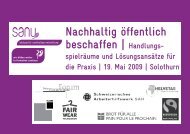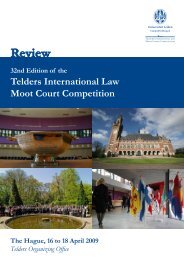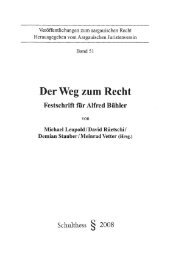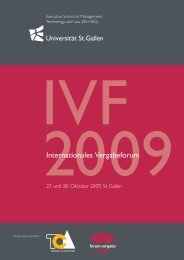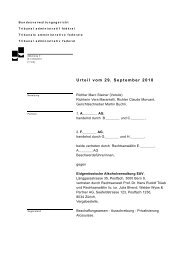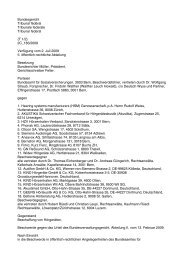Turin, 10 April 2007 - marc-steiner.ch
Turin, 10 April 2007 - marc-steiner.ch
Turin, 10 April 2007 - marc-steiner.ch
You also want an ePaper? Increase the reach of your titles
YUMPU automatically turns print PDFs into web optimized ePapers that Google loves.
Dear Sir/Madam,<br />
I am pleased to inform you that the International Training Centre of the ILO in collaboration with UNEP is<br />
organizing the following training workshop to be held at ITC/ILO in <strong>Turin</strong> in English language:<br />
“Sustainable Procurement - Social, Economic and Environmental Considerations in Public<br />
Procurement”<br />
Course Code: A902532 1 week, 7-11 June 20<strong>10</strong><br />
The objective of this Workshop is to contribute to improved capacity in the conceptualisation and<br />
implementation of environmental and social considerations in procurement, in line with internationally accepted<br />
principles and practices. It targets participants who are directly involved in procurement management and oversight,<br />
as well as those involved at a more strategic/policy level within procurement organizations of international<br />
development institutions and national government entities.<br />
The evaluation of the previous course editions shows that this workshop provides participants with<br />
knowledge and skills that are relevant to their on-the-job needs as well as to their organization/s. Course materials<br />
and training methodology were deemed fit to a<strong>ch</strong>ieve the course learning objectives and satisfactorily met the<br />
participants’ expectations.<br />
Atta<strong>ch</strong>ed please find the Course Flier that further explains course rationale, contents and delivery<br />
methodology. I would appreciate if you could disseminate information about this course to your colleagues, as well as<br />
to other potential candidates.<br />
The participation fees are € 2,000 inclusive of tuition fees, training materials and full-board accommodation<br />
(cost of meals is built into the participation fees and cannot be separated). International air travel is not covered by<br />
the participation fees.<br />
For Nomination form, Commitment Letter and further information please contact:<br />
Sustainable Development and Governance Cluster<br />
Phone: +39-011-693-6364<br />
Fax: +39-011-693-6351<br />
E-mail: m.pisani@itcilo.org<br />
Please do not hesitate to contact me should you require any clarification.<br />
Best regards<br />
George Jadoun<br />
Chief Sustainable Development and Governance Cluster<br />
International Training Centre of the ILO<br />
Via Maestri del Lavoro <strong>10</strong>, <strong>10</strong>127 <strong>Turin</strong> Italy<br />
Tel: +39 011 6936512<br />
Fax: +39 0116936351<br />
e-mail:proc@itcilo.org<br />
Web : http://www.itcilo.org
Sustainable procurement<br />
Social, economic and environmental considerations<br />
in public procurement<br />
<strong>Turin</strong>, Italy<br />
International Training<br />
Centre<br />
www.itcilo.org
Sustainable procurement<br />
Social, economic and environmental considerations in public procurement<br />
Introduction<br />
Procurement is called Sustainable when<br />
organisations put in place processes whereby they<br />
meet their needs for goods, services, works and<br />
utilities in a way that a<strong>ch</strong>ieves "value for money on<br />
a whole life basis" in terms of generating benefits<br />
not only to the organisation, but also to society<br />
and economy, whilst minimising damage to the<br />
environment.<br />
Recently public procurement has become<br />
increasingly in focus as an instrument of public<br />
policy in addition to its traditional role as a<br />
cornerstone of good governance. Sustainable<br />
Procurement (SP) takes centre stage as a key<br />
indicator of governments' commitment to<br />
sustainable development. A<strong>ch</strong>ieving sustainable<br />
development in practice requires that economic<br />
growth supports social progress as well as respect<br />
for the environment, that economic performance<br />
reinforces social equity, and that environmental<br />
policy is cost-effective without compromising the<br />
livelihood of future generations. Governments<br />
should consider how to make better use of<br />
procurement to rea<strong>ch</strong> sustainability objectives,<br />
through balancing the social, economic and<br />
environmental outcomes of public procurement<br />
practices and decisions. In other words, they need<br />
to engage in "Sustainable procurement".<br />
Whilst these issues have, to some extent, been<br />
addressed by private sector organizations with an<br />
interest in 'corporate social and environmental<br />
responsibility' as well as by some public-sector<br />
organizations, yet the knowledge and expertise<br />
within the wider national pur<strong>ch</strong>asing and supply<br />
communities remain relatively limited. Therefore,<br />
by incorporating sustainable procurement<br />
considerations, governments can raise the bar and<br />
act as a "role model" for the private sector to<br />
replicate.<br />
This one-week workshop designed by the<br />
International Training Centre of the ILO (ITC-ILO)<br />
in collaboration with the United Nations<br />
Environment Programme (UNEP) aims to fill this<br />
knowledge gap by presenting a comprehensive<br />
international comparative survey of sustainable<br />
procurement policies and best practices. It also<br />
explores the key concepts for sustainable<br />
procurement and explains how these can be<br />
applied in order to impart competence to the<br />
participants in using the potential of procurement<br />
for the a<strong>ch</strong>ievement of sustainable development<br />
objectives.<br />
Objectives and contents<br />
The objective of this workshop is to contribute to<br />
improved capacity in the conceptualisation and<br />
implementation of environmental and social<br />
considerations in procurement, in line with<br />
internationally-accepted principles and practices.<br />
The following topics are addressed:<br />
<br />
<br />
<br />
<br />
<br />
<br />
<br />
<br />
<br />
Definition and key concepts for SP<br />
The potential of SP for promoting sustainable<br />
development and realizing its benefits<br />
International Regulatory Framework for SP,<br />
including:<br />
– International Environmental and<br />
Labour Conventions/Agreements<br />
– International Trade Agreements and<br />
Regional Economic Integration<br />
S<strong>ch</strong>emes<br />
National frameworks for SP<br />
Products/services prioritization strategies at the<br />
organizational level<br />
The integration of sustainability considerations<br />
in the procurement cycle:<br />
– Procurement planning, requirement<br />
definitions, sourcing, standard bidding<br />
documents, evaluation and award and<br />
compliance monitoring<br />
Main barriers and opportunities for SP<br />
Action plans for the implementation of SP at<br />
organizational level<br />
The role of the civil society and the private<br />
sector
Participants<br />
This course targets participants who are directly<br />
involved in procurement management and<br />
oversight, as well as those involved at a more<br />
strategic/policy level within procurement<br />
organisations of international development<br />
institutions and national government entities.<br />
Candidates are expected to be currently engaged<br />
in the procurement policy formulation and<br />
procurement management. Previous knowledge or<br />
work experience in procurement management in<br />
the public or private sector is an asset.<br />
Course language<br />
The course is delivered in English and the<br />
participants should demonstrate adequate level of<br />
proficiency in the English language.<br />
Course methodology<br />
The course is delivered by senior procurement<br />
specialists, labour-standards and environmental<br />
specialists and consultants from ITC-ILO, UNEP<br />
and other internationally-recognised institutions.<br />
The course is conducted using a<br />
highly-participative training delivery methodology<br />
through a combination of interactive presentations<br />
by subject-matter specialists followed by group<br />
discussions and exercises. Ample opportunity is<br />
provided to explore and discuss benefits and<br />
constraints related to the introduction of SP<br />
considerations in the entire procurement process.<br />
Case studies at national and international level<br />
will demonstrate examples of best practices in this<br />
field and provide a practical orientation for the<br />
participants as to the application of sustainable<br />
procurement principles.<br />
Ea<strong>ch</strong> participant is encouraged to bring along a<br />
copy of the procurement act/manual of its<br />
organisation/country for reference throughout the<br />
course.<br />
Cost of participation<br />
The cost of participation in this one-week<br />
programme is 2000* payable in advance by<br />
the participant's sponsoring organisation. This<br />
covers:<br />
<br />
<br />
tuition fee, whi<strong>ch</strong> includes the use of the<br />
Centre's training facilities and associated<br />
support services, books and training materials;<br />
participant fee, whi<strong>ch</strong> covers:<br />
– accommodation and full-board at the<br />
Centre, plus a standard daily<br />
allowance of 12* to cover<br />
incidental expenses;<br />
– routine medical care and insurance.<br />
Main travel between the participant's home<br />
country and <strong>Turin</strong> is not included.<br />
Fellowships for training programmes conducted by<br />
ITC-ILO generally become available through<br />
development projects financed by International<br />
Financial Institutions or by United Nations'<br />
agencies, bilateral te<strong>ch</strong>nical co-operation<br />
agencies, governments or private enterprises.<br />
Candidates are encouraged to contact these<br />
organisations and agencies in their countries to<br />
enquire about the availability of funds for<br />
fellowship training programmes.<br />
Registration<br />
Nominations to attend this workshop are<br />
processed by writing directly to the Management<br />
of Development Programme<br />
* amount subject to annual <strong>ch</strong>anges.
For further information, please contact:<br />
International Training Centre of the ILO<br />
Management of Development Programme<br />
Viale Maestri del Lavoro <strong>10</strong><br />
<strong>10</strong>127 <strong>Turin</strong> (Italy)<br />
Phone: + 39 - 011 – 6936512<br />
Fax: +39 - 011 - 6936351<br />
E-mail: proc-promo @itcilo.org<br />
Ms. Resy Pec<strong>ch</strong>ioli of our Recruitment Office<br />
Phone: + 39 - 011 – 6936629<br />
Fax: +39 - 011 - 6936767 (direct fax)<br />
E-mail: R.Pec<strong>ch</strong>ioli@itcilo.org<br />
Designer Luca Fiore - Printed by the International Training Centre of the ILO, <strong>Turin</strong>, Italy
International Training Centre of the International Labour Organisation<br />
ACTIVITY TITLE<br />
NOMINATION FORM<br />
CODE<br />
DATE<br />
How did you learn about this activity:<br />
1. Personal history<br />
Please write your name as it is indicated in the passport<br />
Family name:<br />
First name:<br />
Sex: M F<br />
Date and place of birth:<br />
Personal address<br />
(full postal address):<br />
Phone n°: Fax n°: E-mail:<br />
Please indicate the city of the international airport you will<br />
depart from<br />
Please indicate if you need a S<strong>ch</strong>engen visa YES NO<br />
Nationality:<br />
Passport n°:<br />
Place and date of issue:<br />
Expiry date:<br />
Person to notify in case of emergency:<br />
Phone n°:
2. Educational background<br />
Give full details in <strong>ch</strong>ronological order. Give the exact name of the institution and title of<br />
degrees/certificates in the original language. Exclude primary/secondary s<strong>ch</strong>ool if you have a<br />
university degree or equivalent. Include courses and post-graduate studies in your professional or<br />
related field.<br />
From/to<br />
month/year<br />
Institution (name, place)<br />
Certificates,<br />
degrees<br />
obtained<br />
Main field(s) or<br />
subject(s) of study<br />
3. Language knowledge<br />
Please enter appropriate number from code below to indicate your level of knowledge in English.<br />
Code:<br />
1. Limited conversation, reading, routine correspondence<br />
2. Engage freely in discussions, read and write more difficult material<br />
3. Speak, read and write (nearly) as in mother tongue<br />
Speak Read Write<br />
4. Present professional situation<br />
Name of employer:<br />
Address of employer:<br />
Phone n°: Fax n°: E-mail:<br />
Type of organization:<br />
Government<br />
Employers’<br />
Workers’<br />
Organization<br />
Organization<br />
Private Enterprise UN Organization Others<br />
Non-Governmental<br />
Organizations
Are you actively involved in a workers’ or employers’ organization as part-time or full-time officer or<br />
delegate? Please indicate:<br />
Workers’ Employers’<br />
Your job title, personal responsibility and main components of present work:<br />
Does your work require training of other people? If yes describe:<br />
Your expectations from this workshop/course/seminar:<br />
5. Past professional background<br />
Full name and address<br />
of employer<br />
Type of organization<br />
(e.g.: government,<br />
private or public sector,<br />
etc),<br />
Years<br />
of service<br />
Job<br />
title<br />
Date:<br />
Signature:
Letter of Sponsorship<br />
This is to nominate (participant’s name) to attend the training course “code<br />
and course title” whi<strong>ch</strong> will take place at the International Training Centre of<br />
the ILO in <strong>Turin</strong> (Italy) from xxx to xxx. The cost of participation amounts to €<br />
xxx. This figure does not include international travel costs to/from <strong>Turin</strong>.<br />
Sincerely yours,<br />
Sponsoring institution<br />
name<br />
Street address<br />
country<br />
tel<br />
fax<br />
email<br />
(Date and signature of the responsible)



